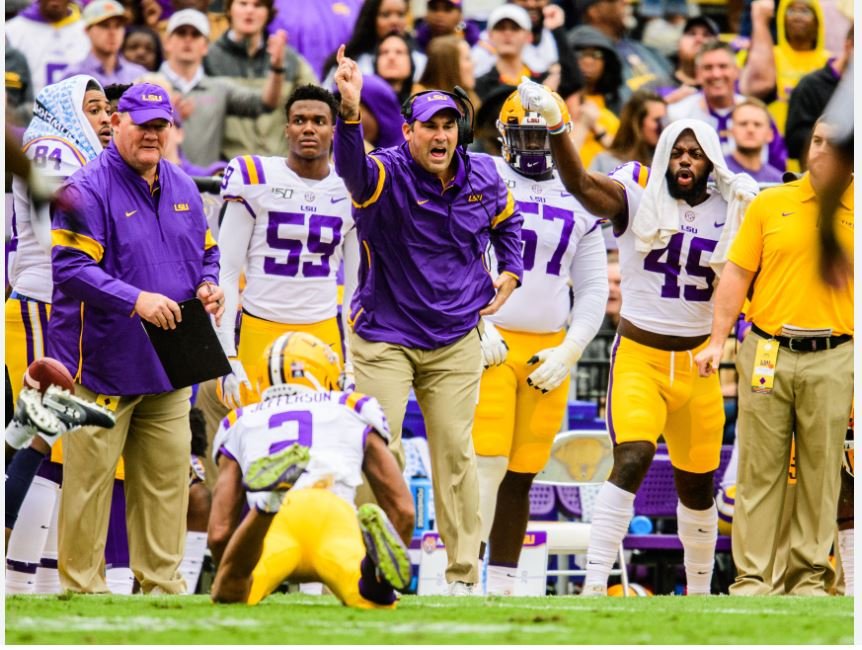NCAA
LSU Tigers Football Under Investigation for Recruiting Violations During C…..more

The LSU Tigers football program, renowned for its illustrious history and passionate fanbase, finds itself under scrutiny for alleged recruiting violations that occurred during the COVID-19 pandemic. This investigation, spearheaded by the NCAA, highlights the intricate dynamics and pressures faced by collegiate athletic programs, especially during unprecedented times like a global pandemic. To understand the implications of this investigation, it is essential to delve into the nature of the alleged violations, the context of NCAA regulations during COVID-19, the potential consequences for LSU, and the broader impact on college football.
Alleged Recruiting Violations
The core of the investigation revolves around the accusation that LSU’s football program engaged in impermissible recruiting activities during the COVID-19 pandemic. Specifically, the allegations suggest that LSU hosted prospective student-athletes on unofficial visits when such visits were explicitly prohibited by the NCAA to mitigate health risks associated with the pandemic. These visits allegedly included in-person interactions with coaching staff, use of athletic facilities, and potentially other benefits that would give LSU an unfair advantage in the highly competitive recruiting landscape.
NCAA Regulations During COVID-19
In response to the COVID-19 pandemic, the NCAA implemented stringent guidelines to protect the health and safety of student-athletes, coaches, and staff. One of the significant measures was the imposition of a “dead period” in recruiting, which suspended all in-person recruiting activities. This dead period extended from March 2020 to June 2021, a time during which no on-campus visits, off-campus evaluations, or in-person contacts were allowed. The rationale behind these restrictions was to minimize travel and in-person interactions, thereby reducing the risk of spreading the virus.
Despite these regulations, reports indicate that LSU may have circumvented these rules. Such actions, if proven true, would not only constitute a violation of NCAA rules but also reflect poorly on the institution’s commitment to public health and ethical standards.
Potential Consequences for LSU
The ramifications of the NCAA’s investigation into LSU’s alleged recruiting violations could be significant. The NCAA has a range of penalties at its disposal, depending on the severity of the infractions and the level of cooperation from the university. Potential consequences include:
- Scholarship Reductions: LSU could face a reduction in the number of scholarships it can offer to prospective student-athletes. This would directly impact the program’s ability to attract top talent in future recruiting cycles.
- Postseason Bans: In severe cases, the NCAA may impose bans on postseason play, preventing the team from participating in bowl games or the College Football Playoff.
- Recruiting Restrictions: The NCAA might enforce additional recruiting restrictions on LSU, such as further limiting the number of permissible recruiting contacts or visits.
- Fines and Financial Penalties: LSU could be subject to substantial fines, adding a financial burden to the athletic department.
- Probation: The program could be placed on probation, which would subject it to heightened scrutiny and additional compliance requirements for a specified period.
- Vacating Wins: In extreme cases, the NCAA might require LSU to vacate wins from the seasons in question, which would impact the historical record and legacy of the program.
Broader Impact on College Football
The investigation into LSU’s recruiting practices during the pandemic has broader implications for college football. It serves as a reminder of the intense pressure programs face to secure top recruits and maintain competitive edges, even in the face of global crises. This case underscores the challenges of enforcing uniform compliance across a diverse landscape of institutions, each with varying resources and motivations.
Moreover, this investigation could prompt the NCAA to revisit its regulations and enforcement mechanisms. It may lead to stricter oversight and more robust mechanisms to ensure adherence to rules, particularly during extraordinary circumstances like a pandemic. Additionally, this situation might encourage other programs to scrutinize their compliance protocols to avoid similar pitfalls.
The Importance of Compliance and Ethical Conduct
Ultimately, the LSU investigation highlights the paramount importance of compliance and ethical conduct in collegiate athletics. The integrity of college sports hinges on fair play and adherence to established rules. Institutions must balance the pursuit of athletic excellence with a steadfast commitment to ethical standards and regulatory compliance.
For LSU, this investigation is an opportunity to reassess and strengthen its compliance practices. It is also a chance for the university to demonstrate accountability and a commitment to reform if violations are confirmed. Transparency and cooperation with the NCAA will be crucial in navigating the fallout from this investigation and restoring trust in the program.
The ongoing investigation into the LSU Tigers football program for alleged recruiting violations during the COVID-19 pandemic underscores the complex interplay between competitive pressures and regulatory compliance in college athletics. As the NCAA delves deeper into the allegations, the potential consequences for LSU could reshape the program’s future and serve as a cautionary tale for other institutions. At its core, this situation reinforces the vital role of integrity and ethical conduct in maintaining the credibility and fairness of collegiate sports. As the investigation unfolds, the college football community will be watching closely, understanding that the outcomes will reverberate far beyond Baton Rouge.
-

 NFL2 months ago
NFL2 months agoBREAKING: Steelers Best Quarterback Suspended for 6-Months Due to…
-

 NCAA1 month ago
NCAA1 month agoI am No Longer Comfortable at Illinois Fighting Illini, Quarterback Cal Swanson Cries Out…
-

 NFL2 months ago
NFL2 months agoJust In: Unexpected Name Surfaces in Rumors for Steelers Coaching Position.
-

 NFL2 months ago
NFL2 months agoRaheem Morris threaten to leave Atlanta Falcons if the Owners fails to….
-

 NFL2 months ago
NFL2 months agoGiants QB Daniel Jones to Undergo 12-Months Suspension After He was Found to be…
-

 NHL1 week ago
NHL1 week agoMinnesota Wild Veteran Player Announces Plan to Leave Team, Cites Poor Management…
-

 NBA2 months ago
NBA2 months agoBREAKING NEWS: LeBron James Has Agreed to Extend His Current Contract at Lakers worth $147.7 millions till…
-

 NHL2 months ago
NHL2 months agoHow should the Chicago Blackhawks handle their unsigned free agents for 2024–2025? Read to Find Out…..












